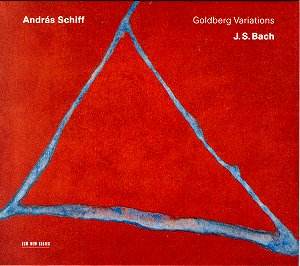Andras Schiff has an
excellent reputation as a Bach pianist,
his interpretation of "The 48" having
been a staple ingredient of the catalogue
for 20 years. I therefore looked forward
to more pleasure from his interpretation
of the Goldberg Variations. Alas, this
performance left me cold and disappointed.
So, why such a difference? The main
reason is the very fast speed adopted,
particularly as, quite rightly, he chooses
to use each repeat. The overall impression
is unfortunately one of being "thrown
off" with virtuosity; not that there
is any argument about the quality of
his pianistic abilities which are beyond
criticism. This performance is the most
rapid on the discs of which I have compared,
taking 71 minutes in total. The rapid
variations are very rapid and the slower
variations are fast.
I have very fond memories
of seeing and hearing the late Rosalyn
Tureck at a performance in the Barber
Institute in Birmingham in 1956-7, just
before her recording of this work for
HMV (now re-issued on Philips 456 979-2PM2).
The atmosphere was electric, for one
could have heard a pin drop in the hour
and a half of music, with an interval
midway. That concert has coloured my
opinion of these performances, but even
so, I admire other artists. The Philips
recording is still available on two
discs, the whole taking 95'17", although
the piano sound is beginning to sound
dated and a bit "plummy". A more modern
version by the same artiste is available
in a "Plus-core" edition from Deutsche
Grammophon on 459 599-2GH2; here one
can still enjoy the performance but
also access the score and print and
play it! Considering this is 41 years
later, the technique is remarkable,
the interpretation little changed, and
the timing is only 4 minutes shorter.
To give but one example
of the differences, I have chosen Variation
29 (the one just before the Quodlibet
and which is one of the more virtuosic).
Schiff throws this off in 1'46", Tureck
(1957) in 2'12" and Tureck (1998) in
2'05". Other respected performers are
Glenn Gould (1981) (Sony SMK52619) who
takes 1'02" (but without repeats), Angela
Hewitt, 2'18" (Hyperion CDA67305), and
Murray Perahia, 2'10" (Sony SK89243).
In the whole work the timings are Glenn
Gould 51'15" (no repeats), Angela Hewitt
78'32", and Murray Perahia 73'29". As
a final caveat: Helmut
Walcha on harpsichord (EMI) takes 75'14",
with variation 29 taking 2'12".
These are only examples
to illustrate my initial comments; the
technique is excellent and the recording
faithful and true throughout. The programme
notes are by Schiff himself, and well
explain the work, particularly as to
why the well-known story of Goldberg's
playing to Count Keyserlingk was very
unlikely to have occurred.
I fully admit that
these observations are from my own preference,
but it all depends on how you like your
Goldbergs - the yolk runny or more well
done.
John Portwood
see also review
by Paul Shoemaker


